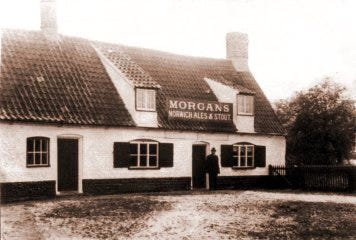Henry, a man who wanted to help
Norfolk man Henry Graves migrated to the city to find a job - or three - that would let him help people
Today, I’m looking at a man who should have been able to become a successful private detective, but who actually only lasted a short time as one.
Henry Graves, in common with many London private detectives, had started as a policeman. Born in Norfolk around 1857, he joined the Metropolitan Police in his early 20s, but did not do as many Met men did - working there for 20 years, and then retiring on a police pension before starting up as private detectives. Instead, Graves left the police within a decade. He therefore had no pension, and relied on his income to maintain himself and his family - making establishing a career in private detection more stressful.
But to begin at the beginning. Henry Graves came from a very poor rural family. He was born in the village of Colkirk, Norfolk. His father, George, was an agricultural labourer, and his mother Rachel also worked in the fields, even while pregnant and with small children. Henry was the second child and eldest son, and he was in a family where the girls went into service as soon as they left school, while the boys joined their father labouring.
A pub in Colkirk, the village where Henry Graves was born and raised
In late 1874 or early 1875, the Graves family moved from Colkirk - where George Graves had been born, and where his older children had similarly been born - to the Norfolk town of Swaffham. The move followed the death of Henry's sister Endora (his parents had two daughters both named Endora, two years apart; both died). Once in Swaffham, Rachel Graves had at least two more children. It might have been at this point that Henry decided not to move with his parents, but instead move to London and take up a different role to that of his father. By 1881, he was a police constable, living at the police section house at Woolwich Dockyard.
Woolwich Dockyard, where Henry was based in 1881
Two years later, he married Jessie Moffatt in Kensington. The couple had three children, including Jessie Susan in 1884, who died shortly after her birth. Only their youngest child, Margaret Kate, born in 1887, survived.
Henry had left the Met and started up as a private detective by 1891, by which time, he and his family had moved to Putney Heath. But by 1901, this new job had either failed, or Henry had had enough of it. He and Jessie both needed to find a job - and they found jobs working together at the Kensington workhouse on Marloes Road. Henry worked there as a wardsman, and Jessie as an attendant. These jobs suited them, and both the 1901 and 1911 censuses record them as employed by the workhouse in these roles.
By 1921, they were in their mid sixties, and so, unsurprisingly, they had left the workhouse. Although Jessie had lived in Kensington most of her life, and had been born there, they now moved back to Henry's home county, setting up home at Mileham, five miles from where Henry was born and brought up. Retirement was short, with Henry dying in Mileham a year later, in 1922. On his death, his widow Jessie moved in with her daughter Margaret, a mental health nurse, in Surrey, and died there nearly 20 years after her husband's death.
Henry was not unusual in that he only worked as a private detective for a relatively short duration; he was more unusual in deciding to do so prior to reaching retirement as a policeman. He was a man of several different careers, all of which were far removed from his family's agricultural background, but they represented a common migration from rural areas into the cities in the 19th century. In London, Henry was able to find employment in several different fields, but all of his employment involved meeting people needing help, and he was able to meet their needs.






Fascinating little story, thank you